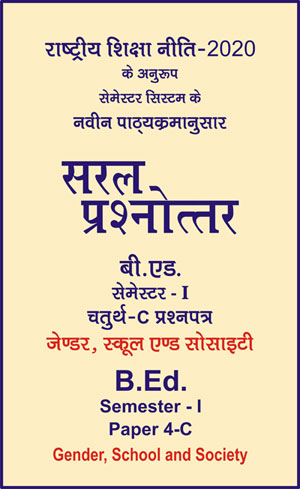|
बी एड - एम एड >> बी.एड. सेमेस्टर-1 प्रश्नपत्र-IV-C - जेण्डर, स्कूल एण्ड सोसाइटी बी.एड. सेमेस्टर-1 प्रश्नपत्र-IV-C - जेण्डर, स्कूल एण्ड सोसाइटीसरल प्रश्नोत्तर समूह
|
5 पाठक हैं |
||||||
बी.एड. सेमेस्टर-1 प्रश्नपत्र-IV-C - जेण्डर, स्कूल एण्ड सोसाइटी (अंग्रेजी भाषाा में)
Question- Discuss the principles and characteristics of Indian patriarchy.
Related Short Answer Questions
- Discuss male dominance in a patriarchal system.
- Is there discrimination against women in a patriarchal family? Answer with reasoning.
Answer -
Principles and Characteristics of Indian Patriarchy
Patriarchy is a flexible phenomenon, whose characteristics remain the same in all societies. The manner in which the patriarchy implements its interests and protects those interests in different societies depends on many factors such as culture and religion. Patriarchy reproduces its existence with the help of many tools such as films, television, politics and political economy.
Following are the characteristics of patriarchy :
Male dominance : In a patriarchal system, it is men who take all the decisions at both the individual and social levels. Men occupy all positions of power and authority; they are considered to be mentally and physically superior than women. Men are attached to certain identities, including qualities of control, strength, being strong, rational, hard-working, ethical, competitive. Each of these qualities contributes to the identity of a man in a patriarchal system. Such stereotypes lead men to adopt and maintain a traditional and prejudicial position towards women and thus justify violence or discrimination against women.
Protecting the authority of men : Patriarchal societies, such as the society of India, work towards protecting the interests of the patriarch (male head of the family) provides power. Men are more vocal and have more employment opportunities than women in the public sector. As part of their masculinity, men tend to be more intelligent, thoughtful and less emotional. Such qualities further encourage and legitimize patriarchal issues in both the private and public spheres. Sexism, negative attitudes, domestic violence, female foeticide and female infanticide are examples of such crimes against women in India.
Discrimination against women : A very fundamental characteristic of a patriarchal society is discrimination against women. Due to the dominance of men and the consequent protection of the authority of men, women naturally become subordinate to men and hence discrimination starts against women. There are many economic, political and social restrictions on women within and outside the family. Preference to male child, early marriage, lack of jobs, domestic violence, economic and social freedom are some of the vivid examples of such discrimination. Generally, the occupations and jobs that women are allowed to go to are in a position inferior to the occupations and jobs of men. Without access to ‘good’ jobs, women will continue to be financially dependent on their male partner or husband. Dependence on economic is one of the factors due to which oppressed women are forced to live with their violent husbands. Divorce or divorce due to lack of self-confidence and economic independence means for a woman that she will be pushed into a state of poverty.
Reciprocal beliefs and stereotypes regarding the roles of women in society : In India, the girl child is often denied her right to education. This is because of the traditional beliefs regarding the expectations of the roles to be played by them in the family as an institution of society. The number of girls who drop out of school in the middle of schooling is much more than the number of boys because girls are expected to help with household chores - whether it is household chores like washing clothes and cooking meals or taking care of younger siblings. Since girls spend a lot of time doing household duties and chores, this widens the equality gap between women and men in rural areas of India. Because ultimately, they have to primarily look after the household chores, get them married soon, have children and then raise those children. Such beliefs and stereotypes persist in families even after marriage. The indispensable role of a wife and a mother is considered an innate quality of being a woman’.
In general, patriarchal societies are more tolerant and lenient towards men neglecting their roles as a husband than women neglecting their roles as a wife. Furthermore, the stigma of a man being single or divorced is not as deep as that of a woman who is unmarried and lives alone with her children. Such women are believed to have failed to live up to traditional expectations as a wife, a mother and a woman (Hajj - Yahia, 2005). The most important factor underlying gender stereotypes and violence has proved to be more power than gender.
|
|||||













